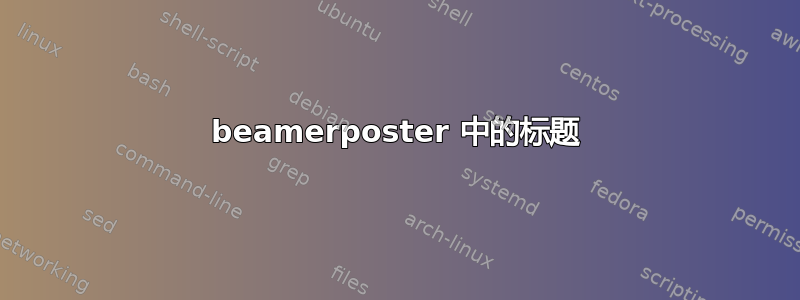
显然,beamerposter 不会自动生成标题,因此必须手动生成。但是,下面的 MWE 不起作用!哪里出了问题?我怎样才能让这个海报设计不那么麻烦?我只想要一个顶部居中的大标题!
\documentclass{beamer}
\usepackage[size=custom,height=105,width=80,scale=1]{beamerposter}
\begin{document}
\begin{frame}{}
\begin{block}
\VERYHuge A Novel Algorithm for #SAT
\end{block}
\begin{columns}[t]
\begin{column}{.45\linewidth}
\begin{block}{FOOBAR}
\VERYHuge foobar
\end{block}
\end{column}
\begin{column}{.45\linewidth}
\begin{block}{FOOBAR}
\VERYHuge foobar
\end{block}
\end{column}
\end{columns}
\end{frame}
\end{document}
答案1
更改#为 --> \#。井号字符#具有特殊功能,LaTeX具有特殊字符代码。控制序列(或者如果您愿意,可以称之为宏)\#被分配用于“排版”字符(因为单独的#解释不同)。
lone#主要用在宏定义中。最好用一个例子来说明。
假设我们有\newcommand\mymacro[2]{Typeset the first argument first, #1\par and then the second argument: #2}。这意味着当您\mymacro像这样调用宏时:\mymacro{foo}{bar},则foo第一组括号内的内容将替换宏定义中放置 的任何内容#1。同样,#2被替换为bar。然后输出为Typeset the first argument first, foo\par and then the second argument: bar。方括号旁边的数字\mymacro[2](数字 2)是告诉 LaTeX多少参数在你的宏中,因为 LaTeX 无法预先知道需要多少个参数。
要使字体变大,您可以使用\fontsize带有两个参数的命令手动控制字体大小。第一个参数与文本的点大小有关,而第二个参数与行间距有关。
为了使标题居中,我只使用了center环境。我认为block它对你没什么用...
为了将标题放在海报的顶部,我使用了命令\vfill,该命令以以下方式平衡当前页面元素:
如果您有两个页面元素,它们之间用 分隔\vfill,它将尽可能地将这两个元素分隔开(它将在\vfill指定的位置“垂直填充”页面)。如果您使用多个命令,您将在两边放置等量的填充,可能会将某个元素居中,该元素的\vfill前后位置均有。
\documentclass{beamer}
\usepackage[size=custom,height=105,width=80,scale=1]{beamerposter}
\begin{document}
\begin{frame}{}
\begin{center}
\protect\fontsize{100pt}{100pt}\protect\selectfont A Novel Algorithm for \#SAT
\end{center}
\vfill
\begin{columns}[t]
\begin{column}{.45\linewidth}
\begin{block}{FOOBAR}
\VERYHuge foobar
\end{block}
\end{column}
\begin{column}{.45\linewidth}
\begin{block}{FOOBAR}
\VERYHuge foobar
\end{block}
\end{column}
\end{columns}
\vfill
\end{frame}
\end{document}


